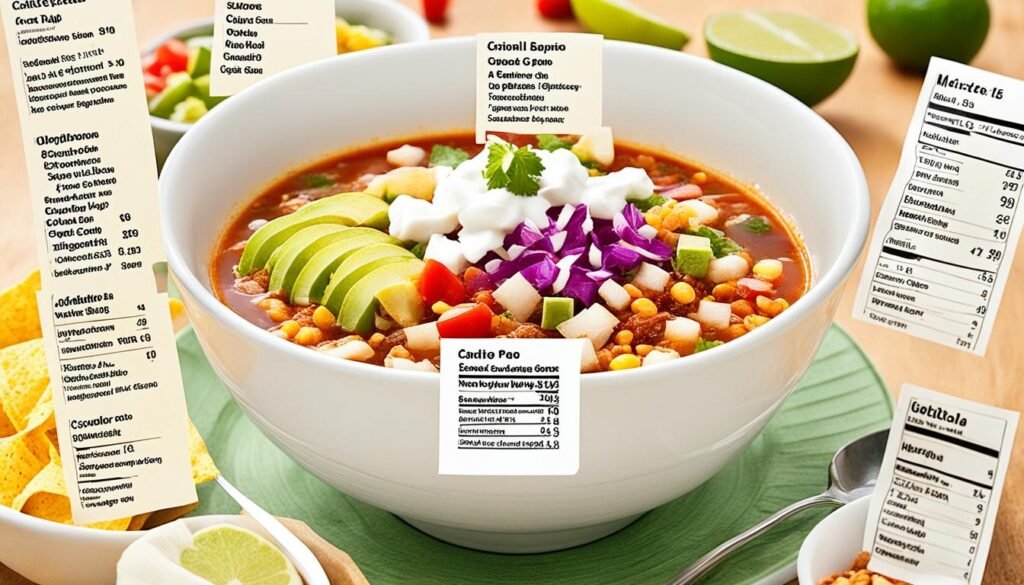Pozole is a traditional Mexican stew that is enjoyed for its comforting flavors and hearty ingredients. But is pozole actually a healthy choice? Let’s explore its nutritional facts to find out.
Ingredients and Preparation of Pozole
Pozole is a flavorful Mexican stew that boasts a rich blend of ingredients contributing to its nutritional profile. To create a delicious and healthy pozole, you’ll need the following key ingredients:
- Chicken: provides a lean source of protein
- Hominy: a type of corn that offers dietary fiber and essential minerals
- Onions: add depth of flavor and nutritional benefits
- Garlic: enhances the taste and offers potential health benefits
- Spices: such as cumin and oregano, known for their antioxidant and anti-inflammatory properties
The preparation of pozole involves a few simple steps:
- Sauté onions and garlic in a pot until translucent.
- Add chile sauce or tomato sauce, chicken broth, cumin, oregano, and hominy to the pot.
- Simmer the mixture with cooked, shredded chicken to infuse flavors.
You can also enhance the taste and texture of your pozole by adding various toppings, such as:
- Shredded cabbage
- Radishes
- Lime juice
- Cilantro
- Avocado
These additional ingredients provide an extra burst of freshness and nutrition to your pozole.
Nutritional Benefits of Pozole
Pozole offers several nutritional benefits due to its ingredients. Let’s take a closer look at how this traditional Mexican stew can contribute to a healthy diet:
1. Lean Protein from Chicken
Chicken is a key ingredient in pozole and serves as a lean source of protein. Protein is essential for building and repairing tissues in the body, supporting muscle growth, and promoting satiety.
2. Dietary Fiber and Potassium from Hominy
Hominy, a type of corn that has been soaked and treated with lime, is another important component of pozole. Hominy provides dietary fiber, which aids digestion and promotes feelings of fullness. It also contains potassium, a mineral that supports heart health and helps regulate blood pressure.
3. Antioxidant and Anti-inflammatory Properties of Spices
The spices used in pozole, such as cumin and oregano, not only add delicious flavor but also offer potential health benefits. Cumin has antioxidant properties that may help protect against oxidative stress, while oregano contains compounds with anti-inflammatory properties.
4. Vitamins, Minerals, and Healthy Fats from Toppings
To enhance the flavor and nutritional profile of pozole, various toppings can be added, such as shredded cabbage, radishes, and avocado. These toppings contribute essential vitamins, minerals, and healthy fats to the dish, further boosting its nutritional value.
| Nutrient | Amount per Serving |
|---|---|
| Protein | 16g |
| Dietary Fiber | 6g |
| Potassium | 420mg |
| Vitamin C | 20mg |
| Vitamin A | 350IU |
| Healthy Fats | 9g |
Table: Nutritional Content of Pozole per Serving (approximately 439g)
As shown in the table above, pozole offers a good balance of macronutrients and contains various vitamins and minerals essential for overall health and well-being.
Remember, pozole can be a nutritious and satisfying addition to your diet, but it’s important to consider portion sizes and the overall balance of your meals. Enjoy this delicious stew in moderation as part of a healthy lifestyle!
Nutritional Facts and Calories of Pozole
The nutritional content of pozole may vary based on the specific recipe and serving size. However, a typical serving of pozole (approximately 439g) contains around 250 calories. It provides a moderate amount of protein, fiber, and various vitamins and minerals. It is important to note that the specific nutrient content may differ based on the ingredients and preparation method used.

| Nutrient | Amount per Serving |
|---|---|
| Calories | 250 |
| Protein | 15g |
| Fiber | 5g |
| Vitamin A | 10% DV |
| Vitamin C | 20% DV |
| Calcium | 6% DV |
| Potassium | 10% DV |
Despite the variations, pozole can be enjoyed as part of a balanced diet due to its moderate calorie content and nutrient profile. However, it is always a good idea to be mindful of portion sizes and choose toppings wisely to ensure you’re getting the most out of this traditional Mexican dish.
Conclusion
In conclusion, pozole is a delightful and nutritious dish that can be a valuable addition to a healthy diet. When prepared using lean proteins, vibrant vegetables, and aromatic spices, pozole offers a harmonious balance of macronutrients and essential minerals.
However, it is crucial to be mindful of portion sizes and the overall composition of your meals. Like any food, pozole should be consumed in moderation, taking into account your individual dietary needs and goals.
By incorporating pozole into a well-rounded and varied meal plan, you can enjoy its wholesome flavors while reaping its nutritional benefits. Remember, the key to a healthy lifestyle lies in mindful eating practices and finding the right balance for your body.
